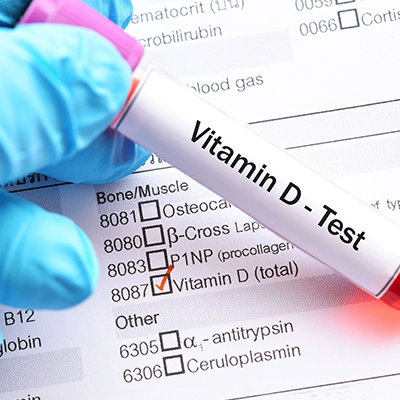 Known as the sunshine vitamin because our bodies can make it when our skin is exposed to sunlight, vitamin D has generally been thought of as a vitamin supportive of bone health. However, studies have linked vitamin D to many additional important health issues:
Known as the sunshine vitamin because our bodies can make it when our skin is exposed to sunlight, vitamin D has generally been thought of as a vitamin supportive of bone health. However, studies have linked vitamin D to many additional important health issues:
Vitamin D Is Crucial For:
Vitamin D Deficiency Is Correlated With:
- Diabetes Risk
- Hypertension
- Heart Disease
- Asthma
- Falls and Fractures Due to Bone Instability
- Autoimmune Diseases
- Cancer
Since a large breadth of conditions are related to vitamin D, getting enough of it is more necessary for our overall health than previously thought. To put this in perspective, people are considered to have healthy amounts of vitamin D in their bodies when their blood contains between 20 ng/mL and 50 ng/mL (nanograms per milliliter) of the vitamin. Deficiency is considered to be a blood level below 20 ng/mL. Unfortunately, it is estimated that over half of the population has vitamin D levels below 20 ng/mL and is thus deficient in this vitamin.
To make matters worse, there is research showing that even the lower end of the conventionally accepted healthy range of vitamin D is insufficient for optimal health. This research indicates that people within the 20 ng/mL to 30 ng/mL range may not in fact be within a healthy range, and are actually at a higher risk for cardiovascular disease, falls and fractures, hypertension, autoimmune dysfunction, and cancer in comparison to people with higher vitamin D levels. This evidence brings to light that the healthy range may actually be higher than previously assumed, meaning an even larger portion of the population is likely dealing with deficiencies and at risk for diseases like diabetes, heart disease, and cancer.
So How Can We Increase Our Vitamin D Levels?
Despite the prevalence of vitamin D deficiency, there are simple steps we can take to increase our levels. If you believe you may be one of the many people with low vitamin D levels (for instance, you experience any of the deficiency symptoms outlined above), please look into the following options.
1) Testing is a great first step:
You can request blood tests from your primary physician or you can request them from us. We offer vitamin D tests at Symmetry through our Boston Heart blood labs.
2) Sunlight:
Since vitamin D is comparable to a hormone, we are able to endogenously convert sunlight into the active form of vitamin D when our skin is exposed to the sun. To intake optimal amounts of vitamin D, it is best to get between 20 minutes to 2 hours of mid-day sunlight exposure on our bare skin, and please keep in mind that darker skin pigmentation requires more sun exposure than lighter pigmentation. However, getting sufficient D via sunlight is especially difficult outside of the tropics and during the non-summer seasons, so we cannot always depend on getting enough sunlight to fulfill our needs.
3) Food:
Foods that are high in vitamin D include fish (especially sardines, salmon, mackerel, herring, anchovies, and tuna) as well as liver. Eggs and dairy also have some vitamin D. Make sure to choose wild caught, pasture-raised, organic sources when possible.
4) Supplementation:
If supplementing with Vitamin D, it is crucial to use a high quality supplement and appropriate dosage. As a fat soluble vitamin, D is stored in fat cells and not simply excreted in the urine when over-consumed. Furthermore, compared to the other fat soluble vitamins (A, E, and K), D has the greatest ability to cause toxicity. To help avoid toxicity and increase vitamin D uptake by the body, ensure you also have sufficient levels of the other fat soluble vitamins A, E, and K, as they balance each other in our bodies. Symmetry offers the Nutri-West brand supplement of vitamin D3 (Complete Hi-D3), a natural and high quality supplement producer, and suggests 2,000 – 5,000 IU’s per day, depending upon need and deficiency.
Please reach out to Symmetry for more information on vitamin D testing and supplementation at [email protected] or call us at (510) 769-0125.
